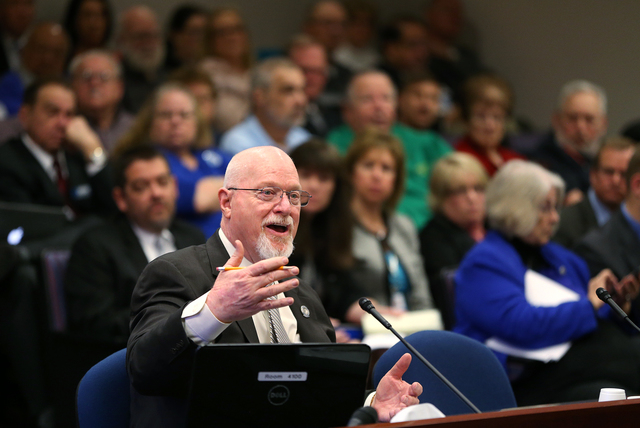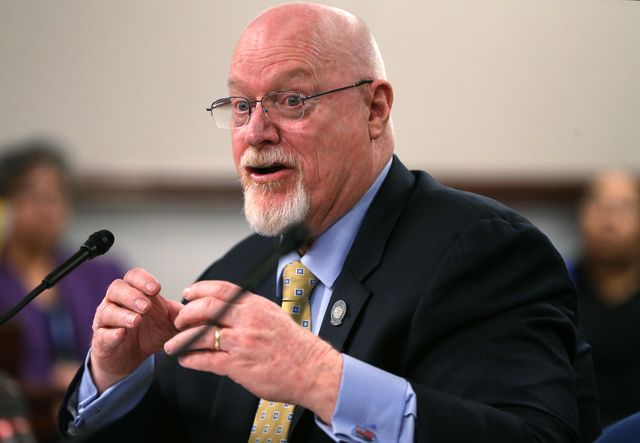Fiscal note: Nevada PERS reform bill would cost $800 million a year
CARSON CITY — A bill seeking to change Nevada’s public employees retirement system for future hires by switching to a mostly defined-contribution plan has a hefty price tag in the neighborhood of $800 million a year, according to a fiscal note submitted for the measure.
The Nevada Public Employees Retirement System estimates that Assembly Bill 190 would cost $790 million in increased contribution rates in the first year of the budget, plus another $18 million to implement the proposed hybrid system for new public employee hires beginning on July 1, 2016.
The cost is estimated at $790 million in the second year and $750 million in future years. The contribution rates would be shared by public employees and their public employers, including the state of Nevada, Clark County, the Clark County School District and the many other participating local governments.
If proved accurate, the costs of implementing the proposal could make it tough for Assemblyman Randy Kirner, R-Reno, to win approval of his measure. The bill is up for consideration Wednesday in the Assembly Government Affairs Committee. It is likely to be referred to the Ways and Means Committee for a review of the fiscal implications of the measure.
Kirner said Tuesday he is not convinced that the fiscal note from PERS is realistic.
“I think there is a substantial difference of view in terms of whether there is or isn’t a fiscal impact, and if how much, and that will all be debated before Ways and Means,” he said.
PERS Executive Officer Tina Leiss said the fiscal note was prepared by the system’s independent actuary, and reflects the fact that the existing defined benefit plan would begin to contract as workers retired and new hires came in under the hybrid plan.
Because the unfunded liability of the existing plan would still have to be paid off, contributions would have to increase to cover that cost, she said. The estimate is that for regular state and local employees, the 28 percent contribution rate needed for the coming two-year budget under the existing system would have to be increased to 43 percent total, she said.
Half the 15 percentage point increase would be borne by public employers, including the state. The other half would be paid by employees. State agencies would see increased costs not reflected in their proposed budgets for the coming two years, Leiss said.
“There may well be savings, but they would come well into the future,” she said.
Kirner has said his plan, which would maintain a smaller defined benefit element along with a defined contribution plan that would be similar to a 401(k) type plan used in the private sector, would help move the state away from the long-term liability implications of defined benefit plans.
PERS has a long-term unfunded liability in the existing plan of more than $12.5 billion. Nevada’s plan is currently 71 percent fully funded.
Kirner said whatever the true fiscal cost of the change, it will likely continue to grow if no action is taken. A similar measure he introduced last session had a fiscal note from PERS of $700 million.
“I think our counties and cities and school districts today are dying the death of a thousand cuts,” he said. “Because maintenance is being deferred because they have to pay for PERS. Books are not being bought because they have to pay for PERS. I think it’s time to address it.”
PERS system officials testified against the bill at a recent hearing, along with many of the public sector employee groups that participate in the system. At the hearing, it was noted that 35 other states have rejected similar changes to public retirement plans as has been proposed by Kirner.
Contact Sean Whaley at swhaley@reviewjournal.com or 775-687-3900. Find him on Twitter: @seanw801.

RELATED STORIES
Sandoval focuses on business license fee as best new revenue option
Government agencies could start charging for use of public records
Sen. Smith to return to Nevada Legislature in April
Vegas couple wants right to carry guns while fostering kids
Controversial Nevada school bond bill signed into law
Poll: Nevadans favor Sandoval tax increase plan
Assemblyman back at work after arrest on DUI charge
See all of our coverage: 2015 Nevada Legislature.


















